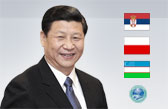China, EU conclude Year of Intercultural Dialogue
(Xinhua) Updated: 2012-12-01 05:34BEIJING - The Chinese government and the European Commission announced the conclusion of the EU-China Year of Intercultural Dialogue here on Friday while promising to deepen cultural cooperation.
Since the event started in February, the two sides have presented about 300 programs regarding literature, arts, philosophy, language, press and publications, sports, youth exchange and tourism, in an initiative which covered all the 27 member states of the European Union (EU) and 22 provinces, municipalities and special administrative regions in China, Culture Minister Cai Wu said at the closing ceremony.
"The China-EU Year has rightly left its mark as a standout highlight in the history of China-EU cultural exchange," he said.
"It is fair to say that cultural interaction between China and the EU is embracing its most favorable environment, with even greater potential lying ahead for exploration."
Although the event has closed, people should look beyond it and take confidence in the continuous flow of EU-China cultural exchange, as the two sides have opened up a new chapter, he added.
Androulla Vassiliou, European commissioner for education, culture, multilingualism and youth, said at the ceremony that the event had encouraged people to move beyond cliches and preconceived ideas and to engage with one another across physical borders and cultural differences.
"We are not so much drawing this special year to a close, rather, we are confirming our common wish to engage in long-term cooperation, as culture has now become a permanent component of our partnership," she said.
Cai and Vassiliou also made a joint declaration at the ceremony, announcing that the Chinese government and the EU wish to deepen cooperation in the field of culture.
It said that the 2012 EU-China Year of Intercultural Dialogue had acted as a useful testing ground for opportunities and challenges in future cultural cooperation.
Under the declaration, China and the EU will pay particular attention to the interests, needs and expectations of the younger generation as well as to the most recent evolutions affecting the cultural sector, including the development of online media.
The European Commission and the Chinese Ministry of Culture stress their particular interest in strengthening cooperation in cultural industries, heritage and contemporary art, the document said.
They would like to deepen the dialogue between respective authorities of the cultural sector and work to create new opportunities for joint projects between all levels of cultural institutions, organizations and actors, it added.
The third EU-China High Level Cultural Forum was also held here on the same day, attracting more than 20 experts, government officials and artists from both sides to discuss cultural diplomacy and cooperation.
Rod Fisher, director of International Intelligence on Culture, told the forum that traditional cultural diplomacy has changed toward a new form which is not only about promoting a selected image of the country but also presenting a rounded picture.
Cultural diplomacy is also changing from focusing on the elite and government exchanges to people-to-people exchanges, especially among young people, he said.
"China is a massive country and has lots of stories to tell. It needs to be aware of the changes in cultural diplomacy so that it can make informed decisions about the best way forward," according to Fisher.
Dieter Jaenicke, artistic director of Hellerau, the European Center for the Arts in Dresden, Germany, also stressed the role of culture in promoting a better understanding of everyday life in foreign countries.
Artists can be excellent ambassadors for their nations but should not be diplomats, he said, adding that diplomats have to follow lots of rules, whereas artists are obliged to create a more interesting, realistic impression.







